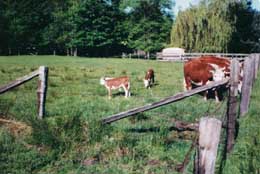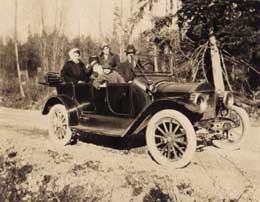Since 1920 when he was born, Robert (Bob) Peterson has lived near King County's Lake Boren. This once bucolic setting, now within Newcastle's incorporated city limits, is surrounded by new developments. On March 4, 2000, six days before his 80th birthday, Bob shared his family's story and photographs. This slideshow was edited and curated by Heather MacIntosh.
Peterson, Bob: I've Lived Here All My Life -- A Slideshow of Life on the Eastside, King County
- By Heather MacIntosh
- Posted 8/04/2005
- HistoryLink.org Essay 7407

Enticed by the Gold Rush, he settled there briefly, and set up a bicycle shop. This is Bob's dad riding a bicycle in Alaska, around 1900.

Bob points to an idyllic scene, "this is my dad courting my mom. He was a sharp cookie. He was quite a dude. He had a good line, 'cause he enticed my mother into marrying him, and got her to move out here."

"My mother was a lady. She was in the DAR (Daughters of the American Revolution). She was originally from down south ... she was elegant, and they came out to this dump."

"When she married my dad, this was her third marriage. I had three older half-sisters, not just my brother and I." This is (clockwise, from far left, half sister Melwood, Aunt Dodie, an uncle, Grandmother Rumley, Miriam and Nell)

"We'd all go over to West Seattle, to Alki down by Fauntleroy, or to Woodland Park. It was the thing to do, a really big deal. We'd pack a picnic."

"In 1916, my father came out here. He started that farm down there and called it Woodstock. The railroad track used to run right along here, up to Newcastle and Coal Creek, to bring out coal. The train came up here twice a day. It would leave in the morning and come back in the afternoon."

"When my mother came here, she worked in Seattle for Layman and Hanford, which was a stenographer place on Third Avenue and Marion. She used to go back and forth to work everyday until my brother and I were born. She took the Newcastle train down to Renton, then the Interurban into town. I used to get sick on that train."

"My brother was a year and half older than I was, and like I said I was born in 1920, so he was born in 1918." This photograph was taken on the day that World War I ended. On the other side of this photo, Effie wrote, "November 7, 1918, danced, sang, rejoiced" She holds her newborn son Alan.

"This one here is me and Alan riding bicycles by the brooder house. This one is the same place when it snowed."

"My folks had a car, but when they first came here, they didn't. They would hike up from Kennydale, then take the ferry boat across Lake Washington. This picture here is Melwood and my mother. This is Nell on a pier on Lake Washington somewhere."

"When the mine was running we had cows, we didn't have any pigs, but we had chickens and we made butter, and we took butter and eggs and chickens and sold them up at Coal Creek. Once a week he'd make a run, and that was our primary source of income."

"Originally, see, there were no houses here, it was just brush ... This is my folks clearing the land."

"There were no herd laws for cows. We used to milk our cows in the morning, turn them out, and they used to run all over this country. Every night, when we came home from school, we would have to go hunt them cows."

"We always had a hired man to milk the cows and take care of the chickens and that, and later on ... one of them drowned.
"We had a hired man that used to swim at night in Lake Boren ... I remember going down there. You could see him, although the lake was kinda muddy. You could see his body down on the lake there. My dad fixed a long pole with a wire loop on it and reached in and got a hold of him and pulled him up. When they got him up, our dad didn't let us stay there. Our dad told us to go into the house.
"I remember he was in this position, kind of, you know ... apparently he had had a cramp, and he was nude. Went swimming after dark."

-------------------------------------------------------------------------------- "These hired men used to come out of a hiring hall down off of Occidental, close down from the Seattle Hotel. We would pay them $30 a month, plus room and board, so that was a dollar a day, during the 20s."

"This is me and my brother with our nephews Forest and Billy riding on Doc, our workhorse. And this here's my dad with Doc."

"This is my mother's good friend. I called her Momma Lara. She was the section boss' wife, Lara Hanson. She used to babysit me. My mother used to take me up to her place in Newcastle, right around the corner."

"When my brother and I were 10 or 12 years old, my dad said we could milk the cows. So we'd get up in the morning and milk six or eight cows, and then we would turn them out some place on the farm so that we could get them in the next morning. Sometimes in the winter, they'd stay in the barn overnight cause there was no place else for them to stay. We'd get up and milk them in the morning, then go to school..."

"I first went to school in Union Town. That was put together when these miners went on strike up here in Newcastle. Those were the union guys, so the town was named Union Town or Unionville. I can't tell you where they got their lumber to build their houses, but they had all kinds of houses there that were all the same, old board and batten 2 x 12's. Must have been at least 15 or 20 families down there, right where 89th Avenue turns down. There were two school buildings there. I went to school there 'til my third grade. Yeah, it was a one-room school house with a double door on the front."

"I lived down at the other end of the lake 'til we got this place. We've been married 58 years. We were married in Lake Boren Park in 1941"

"We built this house. It has been built on 11 times. Part of it, like this half and this half, we lived in through the first part of our married life. Then we moved it up on the Skagit River for a while. We've got this property here, though, so we come back. I remember saying 'I'm going to live here, I'm going to work here.'"
Licensing: This essay is licensed under a Creative Commons license that encourages reproduction with attribution. Credit should be given to both HistoryLink.org and to the author, and sources must be included with any reproduction. Click the icon for more info. Please note that this Creative Commons license applies to text only, and not to images. For more information regarding individual photos or images, please contact the source noted in the image credit.







